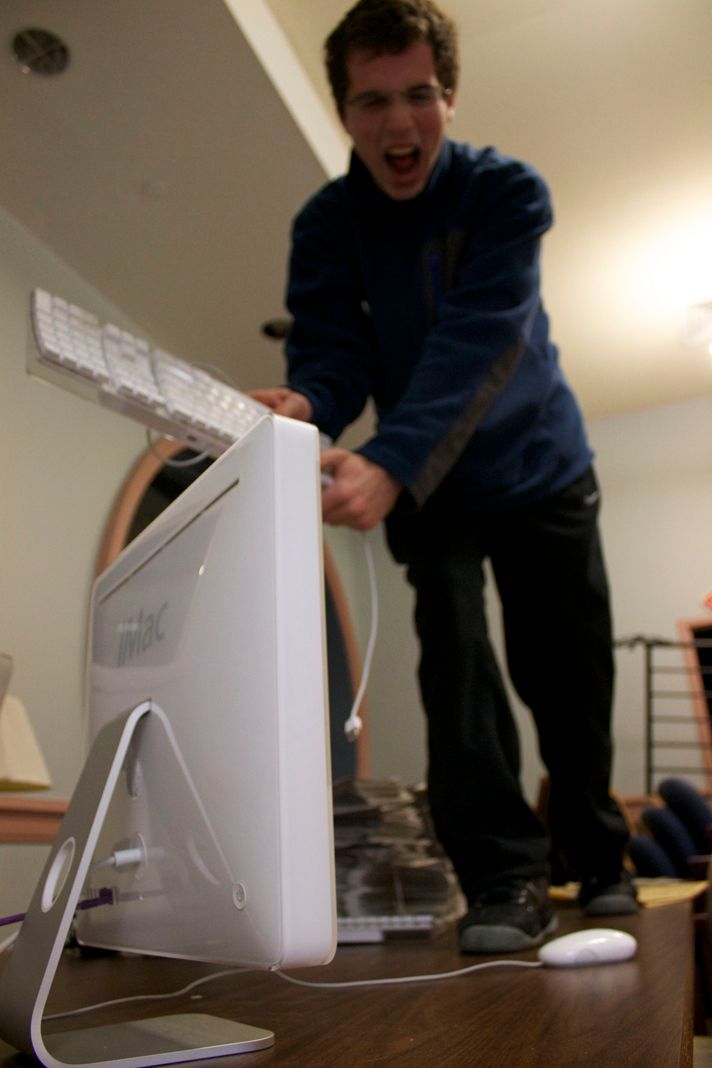RAGIN’ RANTS: Dial Me Up To Speed

I had exactly five tabs open on Google Chrome when I wrote this rant. The first tab was Grooveshark, my main source for finding and listening to music. The second was for my email, which I need to check constantly for class and which basically accounts for half of my contact with the world outside of Amherst. The other half is taken care of by the third tab, Facebook. Facebook functions as my only social life during times when I’m stressed or just too busy to leave my room and face the sunlight. The tabs are rounded out by XKCD and Cracked, two sites I use to waste time and have a good laugh. These five tabs together comprise a significant part of my life and perform functions that are vital to my survival at this school. I actually have a tough time imagining a day when I don’t use the Internet. I’m sure that I could manage it somehow, but I’d wake up the next morning having missed three assignments and realize that more captioned photos of cats doing adorable things had been uploaded during my time away than I could read in a thousand lifetimes. Believe it or not, the Internet is a big part of my life. It’s a big part of most people’s, especially college students’, which makes it so puzzling that the Internet connections at Amherst are so incredibly bad.
The first time I had ever used an Ethernet cable was in the hotel I was staying in in Northampton the night before I moved into my dorm. I couldn’t get the wi-fi to work so my dad offered me an alternative option, a cord. I remember remarking on how primitive I felt, saying something about how I might as well check my email by candlelight, but I needed to get online and there were no other options so I made do with what I had. That night I got my first taste of using an Ethernet cable, and needless to say, it was far from my last. Nowadays I have that cable with me about as often as I have my cellphone. That’s because the Internet on campus without an Ethernet cable is just too slow. It can handle normal browsing tasks to a degree. If it’s just email or a text-based website then the Amherst Secure network should hold up fine. That is, unless you want to use it during the high traffic hours, generally from around 9 to 11 p.m., when the speed slows to a crawl. Of course if you want to listen to music or watch a video then no matter what time you log on you’re going to encounter problems. I have a radio show at WAMH, the Amherst radio station, and I stream all my music from Grooveshark. What that means is that I have to stretch out my Ethernet cable into a different room to find a port for it, because the alternative is that the songs will have to stop to buffer every five seconds. Buffering, as you may know, is the bane of the existence of Internet music and videos and can turn any viewing or listening session into a frustrating affair. I thought I’d left buffering in the past with dial-up and AOL. Then I came to Amherst and learned just how wrong I was.
If the Internet was just something that I used for pleasurable activities like browsing webcomics or watching movies on Hulu, then the speed of the College’s wi-fi would be understandable. The problem is that I go online to do any number of class-related activities, and my ability to do these things is hindered by a slow Internet connection. From checking homework to emailing professors, life is that much harder with spotty wi-fi. However, by far the most egregious example of school work made difficult by the Amherst network is assignments that involve watching movies. Quite simply, these assignments cannot be finished without an Ethernet cable. The school even tells students that an Ethernet cable is “required” for viewing these movies. To me this is where the school’s Internet problems move from aggravating to ridiculous. If the network needs to slow down my attempts to re-watch the first three seasons of “The Big Bang Theory” that’s fine, but when it actively prohibits me from doing my work it can no longer be viewed as a mere inconvenience.
Obviously the ideal solution to this problem would be for the school to simply get a faster wi-fi network. Sadly if this problem could be fixed that simply then it likely already would have been fixed. And I know for a fact that the school is taking some steps to improve the Internet connection on campus. In the meantime, Amherst could at least take one small step to help its students: it could give each student a free Ethernet cable. The school already provides the cables at a highly-discounted $5. However many people still haven’t bought them because they were not aware of the offer and do not know how to order. Even more pressing is the idea that if they are going to be a requirement for classes then the least the school could do is provide us with a means to complete our work. After all, we’re here to learn: this is just one more way that Amherst can help us do so.





Comments ()